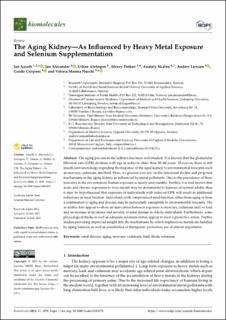| dc.description.abstract | Abstract The aging process in the kidneys has been well studied. It is known that the glomerular filtration rate (GFR) declines with age in subjects older than 50–60 years. However, there is still insufficient knowledge regarding the response of the aged kidney to environmental toxicants such as mercury, cadmium, and lead. Here, we present a review on the functional decline and proposed mechanisms in the aging kidney as influenced by metal pollutants. Due to the prevalence of these toxicants in the environment, human exposure is nearly unavoidable. Further, it is well known that acute and chronic exposures to toxic metals may be detrimental to kidneys of normal adults, thus it may be hypothesized that exposure of individuals with reduced GFR will result in additional reductions in renal function. Individuals with compromised renal function, either from aging or from a combination of aging and disease, may be particularly susceptible to environmental toxicants. The available data appear to show an association between exposure to mercury, cadmium and/or lead and an increase in incidence and severity of renal disease in elderly individuals. Furthermore, some physiological thiols, as well as adequate selenium status, appear to exert a protective action. Further studies providing improved insight into the mechanisms by which nephrotoxic metals are handled by aging kidneys, as well as possibilities of therapeutic protection, are of utmost importance. Keywords: renal disease; aging; mercury; cadmium; lead; thiols; selenium | |
